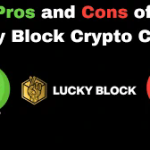# Introduction to Scott Ryder and Lucky Block

Scott Ryder is a prominent figure in the world of blockchain technology and cryptocurrency, widely recognized for his contributions to innovative projects that seek to reshape how we engage with digital assets. Among these initiatives is Lucky Block, a progressive gaming and lottery platform that aims to revolutionize the gaming experience through blockchain’s unique attributes. This article delves into the nexus of Scott Ryder’s vision and the ambitious goals of Lucky Block, exploring their impact on the industry and what they signify for the future of online gaming and digital gambling.
# The Rise of Scott Ryder
Scott Ryder’s journey in the tech industry began with a strong foundation in computer science and software development. His early career saw him engaging in various tech startups, where he honed his skills in programming while developing a keen interest in emerging technologies, particularly blockchain. As cryptocurrencies began to gain traction, Ryder recognized their potential not only as financial assets but also as transformative tools for various sectors.
In his quest to create meaningful change, Ryder became an advocate for decentralized systems that prioritize user empowerment and transparency. His vision was clear: a world where individuals have control over their digital identities and financial transactions, free from the constraints of traditional financial systems. This vision materialized into the conception of Lucky Block, a groundbreaking platform that embodies these principles and leverages blockchain technology to enhance the gaming experience.
# Understanding Lucky Block
Lucky Block is a decentralized lottery system that utilizes blockchain technology to provide a secure, transparent, and fair gaming experience. Unlike traditional lotteries that often come under scrutiny for their lack of transparency and high operational costs, Lucky Block aims to eliminate these issues through its innovative model. At its core, Lucky Block seeks to democratize the lottery experience, making it accessible to a broader audience while ensuring that participants have a fair chance of winning.
Players can purchase tickets using cryptocurrencies, allowing for seamless transactions while retaining anonymity and security. Lucky Block’s smart contracts handle all aspects of the lottery process, ensuring that the draw is conducted fairly and that winners receive their prizes automatically. This layer of trust instilled by blockchain technology is crucial in building confidence in the system, a key aspect that sets Lucky Block apart from traditional lottery platforms.
# Features of Lucky Block
One of the standout features of Lucky Block is its unique ticketing system. Users can buy tickets with popular cryptocurrencies, making participation easier than ever. Additionally, the platform offers a wide range of lottery games, ensuring that there’s something for everyone. Whether users prefer traditional number draws or innovative game formats, Lucky Block caters to a diverse audience.
Another aspect that enhances its appeal is the possibility of earning cryptocurrency rewards. Players not only stand a chance to win significant cash prizes but can also accumulate tokens and engage in the platform’s ecosystem beyond mere participation. This dual incentive system encourages users to stay engaged and explore the myriad of opportunities available within Lucky Block.
# The Blockchain Advantage
The application of blockchain technology in Lucky Block is its most defining characteristic. By utilizing a decentralized ledger, all transactions are recorded in a public and immutable format, ensuring that users can verify the integrity of the lottery draws. This transparency addresses one of the biggest concerns in traditional lotteries—trust.
Moreover, blockchain technology reduces operational costs significantly. By eliminating the need for intermediaries and minimizing overhead expenses typically associated with running a lottery, Lucky Block can return a larger portion of the prize pool to its players. This not only enhances player satisfaction but also fosters loyalty, as participants see the genuine value in the platform.
# Scott Ryder’s Vision for the Future
Scott Ryder’s vision for Lucky Block extends beyond just being another lottery platform; he sees it as a stepping stone toward a larger ecosystem of decentralized finance (DeFi) and gamified experiences. Ryder envisions a future where individuals can engage with various financial products and services, all built on a foundation of trust and transparency offered by blockchain.
In Ryder’s perspective, the potential of Lucky Block resonates well with the broader trend of integrating gaming and finance—a concept often referred to as GameFi. He believes that by merging these two sectors, it’s possible to create immersive experiences that not only entertain but also empower users financially. Through initiatives like Lucky Block, Ryder seeks to inspire a new wave of innovation in how digital assets are utilized.
# Community Engagement and Governance
A significant aspect of Lucky Block’s development strategy is community engagement. Scott Ryder understands that for a decentralized platform to thrive, it must have the backing of its users. Therefore, Lucky Block incorporates a governance model that allows token holders to influence decisions within the platform. This could involve everything from voting on new game features to participating in decisions around prize distributions.
Community members are encouraged to participate actively, contributing to discussions about the platform’s future. This inclusive approach fosters a sense of ownership among users and aligns with the decentralized ethos of blockchain technology, where every participant can have a voice in shaping the platform’s trajectory.
# The Challenges and Future Outlook
Despite its promising features and strong community engagement, Lucky Block faces several challenges as it strives to establish itself in a competitive market. Regulatory scrutiny surrounding cryptocurrencies and online gambling varies widely across jurisdictions and can pose hurdles to widespread adoption. Scott Ryder acknowledges these challenges and advocates a proactive approach, working closely with legal advisors and industry experts to ensure compliance and promote responsible gaming.
Looking ahead, Lucky Block’s roadmap is filled with ambitious plans, including the expansion of its game offerings and partnerships with other businesses in the blockchain space. Ryder envisions a future where Lucky Block not only stands as a leading lottery platform but also plays a key role in the broader conversation around decentralization and financial inclusivity.
# Conclusion
In summary, Scott Ryder’s Lucky Block represents a significant innovation in the realm of online gaming and cryptocurrency. By combining blockchain technology with a user-centric approach, Lucky Block aims to redefine the lottery experience, making it fairer, more accessible, and more transparent than ever before. With Ryder’s vision steering the project, the potential for Lucky Block to influence the future of both gaming and finance is immense. As this platform continues to evolve, it serves as a noteworthy example of how blockchain can drive innovation and create meaningful change in traditional industries.
In this ever-evolving landscape, Scott Ryder and Lucky Block are poised to play pivotal roles, championing a future characterized by enhanced user experiences and empowered communities in the realms of gaming and finance. As we continue to witness the digitization of various sectors, the emergence of platforms like Lucky Block showcases the transformative power of technology when aligned with visionary leadership.

